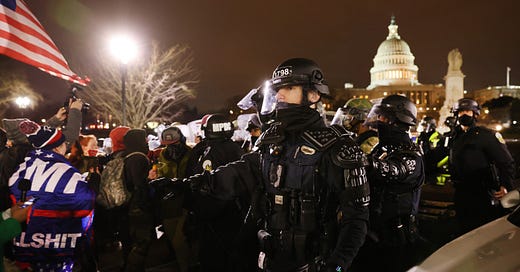The Essence of Trumpism Is the Avoidance of Consequences
The through-line for January 6.

1. Consequences
I wrote something last night and then deleted it, because it sounded bloodthirsty when I meant it sincerely: Why didn’t the Capitol Police use deadly force against the insurrectionists?
Don’t get me wrong: I’m glad the police didn’t start shooting. Many, many people would have died. The police managed to protect the lives of those who worked in the Capitol without firing on the aggressors, with the exception of a single round discharged from within the House Chamber that killed Ashli Babbitt as she attempted to breach the door.
That’s extraordinary police work. But also, it is maybe not the norm?
If you or I assaulted a random cop, we might reasonably expect to be shot. Yet the people who stormed the Capitol did all of that and much worse—and were treated instead with forbearance and professionalism. The Capitol Police seemed to understand the gravity of the moment, they understood the consequences of escalation even when their personal safety was under threat. The very system that the Trumpists were trying to undermine and overthrow, saved these people from experiencing the same immediate consequences that most people would experience in an attack against the police.
And that’s a theme running through Trumpism. It’s all about gaslighting and cos-play and never admitting a mistake and never saying sorry. Which combines to give permission to people who never want to take responsibility for their actions.
There was a clip played during the hearing of two very fine people inside the Capitol in which one explained that he was willing and eager to “lay down his life” for Donald Trump. (See the clip at 9:54 in the video below.)
This is the kind of sentiment we hear a lot of. The leader of the Oath Keepers, Stewart Rhodes, was seen during the hearing in a different clip telling his followers in the weeks before January 6 that “It will be a bloody and desperate fight. We are going to have a fight. That can’t be avoided.”
On January 5, Steve Bannon warned that “All hell is going to break loose tomorrow. Just understand this, all hell is going to break loose tomorrow.”
All hell did not break loose for Steve Bannon, personally. He was able to broadcast his threat against the republic, nestle in at a luxury hotel, and be back on his podcast mic the next day.
None of these men experienced any of the consequences of their boasts on January 6. The gentleman who was eager to “lay down his life” did not. Stewart Rhodes did not get bloody. By all appearances, Steve Bannon did not even miss a meal.
Maybe justice will come eventually—Rhodes, after all, has finally been charged with seditious conspiracy. But don’t get your hopes up.
The entire Trump universe is filled with people who have done bad things and experienced no consequences. Sarah Huckabee Sanders lied to the FBI. You or I might face prosecution for such an act. The people of Arkansas are going to elect her governor.
Jared Kushner was, at best, an inept failson-in-law. At worst, he allowed his family to sell access to the president. Instead of becoming either a joke or a pariah, he has been given $2 billion by Saudi Arabia.
Trump himself has skated through life without experiencing consequences of any sort: draft dodging; connections to the mob; bankruptcies. And then, taking the full measure of the man, the great and good American people—or 46.1 percent of them, anyway—decided to make him leader of the free world.
The story of Jan. 6th is the story of the Trump years and is also the story of modern America. We have created a system in which some people—and only some people—are habitually and repeatedly insulated from the immediate consequences of their actions.
They think that they can say anything, do anything, and walk away. That consequences are only for other kinds of people.
2. Don’t They Have Mortgages?
Here’s another question I kept asking myself while watching the Committee hearing: How do these people pay their rent?




